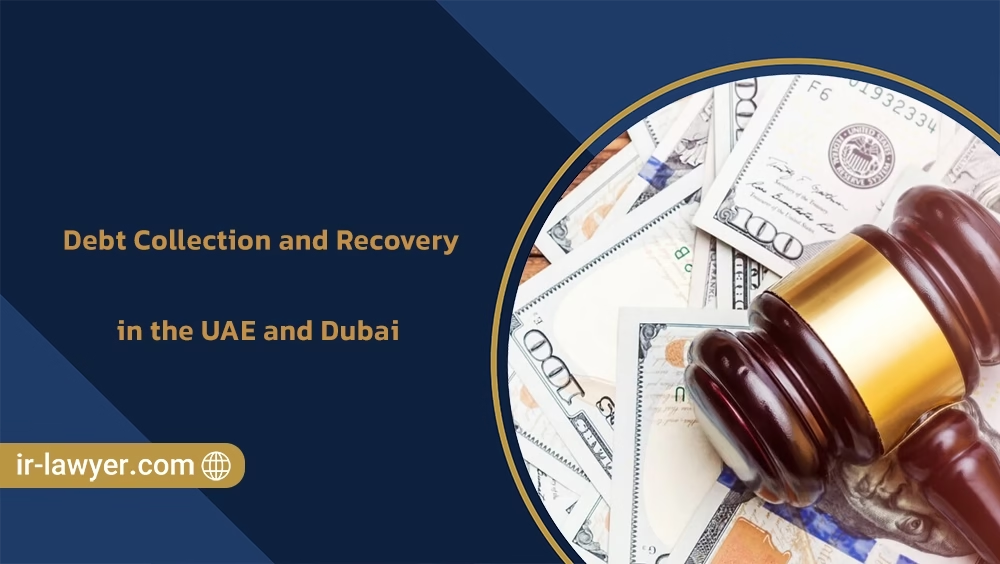
Introduction
The concept of debts dates back to the early times of exchanging goods and services, where if one party failed to deliver the promised goods or services, a claim for debt recovery would arise. In the United Arab Emirates, due to its economic growth and market diversification, businesses and individuals face challenges in recovering overdue debts. This process can be complex, particularly in the absence of specialized courts for financial disputes. Therefore, legal advisors in the UAE can assist in simplifying this process. In this regard, Khalil Asayesh, a specialized attorney in the UAE, has extensive experience in debt recovery and can guide you through the process. With a deep understanding of UAE and Dubai laws and legal procedures, he helps ensure that overdue debts are collected efficiently and swiftly. Debt recovery refers to the process of pursuing an individual to recover an amount owed to them. If you are also facing challenges in debt collection in the UAE or Dubai from Tehran, Khalil Asayesh, a lawyer based in Tehran, can offer effective solutions for pursuing and collecting your debts. In Dubai, businesses encounter specific challenges when it comes to debt recovery. Despite legal advancements in the country, issues such as the absence of specialized financial courts complicate the debt recovery process. Therefore, familiarity with the legal procedures and available solutions can help creditors find the correct path to recover their debts.
Definition of Legal Terms in Debt Recovery in the UAE and Dubai
Debt Definition: Debt is a financial obligation arising from a service, product, loan, or other liability.
Default of Payment: Failure to fulfill payment obligations, including bounced checks or unpaid invoices, may lead to default.
Debt Collection Methods: Creditors may pursue debt collection through negotiations, debt collection agencies, or legal action.
Out-of-Court Negotiations: Creditors and debtors may attempt to resolve the debt through direct negotiations.
Debt Collection Agencies: Professional debt collection agencies in Dubai can be hired to recover debts on behalf of creditors.
Legal Action: If negotiations fail, creditors may initiate legal proceedings in civil courts. You can contact Khalil Asayesh, a lawyer in Dubai and the UAE, for advice and guidance on legal action.
Court Procedures: Civil courts are responsible for handling debt recovery claims in the UAE. The procedure typically involves filing a lawsuit, serving notice to the debtor, and presenting evidence and documentation.
Judgment and Enforcement: If the creditor prevails in the case, the court may issue a judgment in their favor. This judgment can be enforced through various means, such as asset seizure or salary garnishment.
Challenges in Debt Collection in the UAE and Dubai
– Lack of Specialized Courts: The absence of specialized financial courts means that debt recovery claims must be handled by civil courts, which can be time-consuming and costly.
– Complex Legal Procedures: Despite legal advancements, the legal system in the UAE can still be complex and challenging for both creditors and debtors. In this regard, Khalil Asayesh, a lawyer based in Dubai with extensive experience in legal matters and debt recovery, can provide the necessary guidance to resolve your legal issues in the country. With his mastery of local laws and legal practices, he helps ensure that overdue debts are recovered effectively and swiftly.
– Payment Methods: Local payment methods and cultural factors can impact the effectiveness of debt collection efforts.
– Bankruptcy Procedures: Bankruptcy laws and procedures in the UAE can affect the debt recovery process, especially in cases of bankruptcy or financial crises.
Debt Recovery Strategies in the UAE
Despite these challenges, creditors can use various strategies to recover debts:
– Out-of-Court Negotiations: Attempting to negotiate and reach an agreement directly with the debtor may be a more efficient and cost-effective approach.
– Debt Collection Agencies: Hiring a professional debt collection agency can assist in recovering debts through various means, including contacting the debtor, sending payment demand letters, and, if necessary, initiating legal proceedings.
– Legal Action: If negotiations fail, creditors may need to pursue legal action through civil courts. This process can be time-consuming and costly, but in some cases, it may be necessary. It is advisable to contact a lawyer in Tehran and Dubai for assistance.
Legal Process of Debt Recovery in the UAE and Dubai
Why is Legal Debt Recovery Important?
Legal debt recovery is often the last resort for businesses and individuals looking to recover overdue debts. If no amicable agreement is reached in your favor, legal options should be pursued.
What is the Legal Process for Debt Recovery?
The legal process for debt recovery is a judicial and legal method that involves several steps to ensure debts are recovered effectively and lawfully.
Investigation
The first step in the legal debt recovery process is conducting a thorough investigation, which includes gathering all relevant information about the debtor, such as financial status, contact details, and previous payment history. The aim of this investigation is to understand the debtor’s circumstances in order to formulate an effective method for recovering the debt.
Negotiation
After collecting sufficient information, the next step is negotiation. The goal of this step is to reach an amicable settlement between the creditor and debtor without the need for legal action. This stage typically involves discussing payment plans or settlements that are manageable for both parties.
Pre-Litigation Stage
If negotiations fail, the pre-litigation stage begins. This step is highly effective in the legal debt recovery process. In this stage, an official communication is sent to the debtor specifying the overdue amount and requesting payment within a specific period. This stage acts as the last opportunity to resolve the issue before legal action is taken.
Legal Action
If all previous efforts to recover the debt fail, legal action may be initiated by filing a claim in court to recover the overdue amount through judicial means. Creditors should understand that this stage can be time-consuming and may involve additional costs. Therefore, it is essential to consult with a lawyer in the UAE or Dubai.
Role of a Lawyer in Facilitating the Debt Recovery Process in the UAE
Legal debt settlement plays a significant role in facilitating the debt recovery process, especially in the UAE. Debt recovery lawyers and specialized legal advisors serve as guides and consultants for debt collection, allowing creditors to recover what is owed to them through legal means. Lawyers work closely with courts to initiate and oversee the debt collection process, ensuring that fair treatment is afforded to all parties involved. Debt recovery lawyers and legal advisors in the UAE are valuable resources for businesses seeking to recover overdue debts. Their expertise in local laws and regulations makes them essential partners in the debt recovery process.
Debt Collection Laws in the UAE
Legal Framework for Debt Collection in the UAE
The legal framework for debt collection in the UAE is primarily governed by the Civil Transactions Law (Federal Law No. 5 of 1985) and the UAE Commercial Transactions Law (Federal Law No. 18 of 1993). These laws provide the legal basis for debt recovery and define the rights and obligations of both creditors and debtors.
Judicial Process for Debt Collection in Dubai
In some cases, after sending reminders and formal warnings, and after direct contact from a debt collection agent, the debtor still refuses to pay. In such cases, the next step is to refer the case to court. Ultimately, you are entitled to recover your money.
Filing a Lawsuit
If the debtor resides in Dubai, legal action must be initiated in one of Dubai’s courts. For civil matters, this is typically the Court of First Instance. Only in disputes concerning the Dubai International Financial Centre (DIFC) Special Economic Zone should the case be referred to the DIFC Court, where proceedings are conducted in English. To begin the litigation process, a complaint is filed with the court. This can be done physically (at the court’s case management office) or digitally through eFile. You must provide personal details of the claimant and the defendant along with an explanation of the claim. Therefore, it is essential to consult with a specialized lawyer in Dubai. Additionally, supporting documentation must be submitted, which can include contracts, invoices, payment reminders, or email correspondence. All documents must be translated into Arabic (unless the case is referred to the DIFC Court).
If you transfer your case to Khalil Asayesh, a lawyer in Dubai, he will handle all matters related to documentation, ensuring you have no concerns.
Notification
Within 10 days of the filing of the complaint, the court clerk, through a court officer (judicial officer), will notify the defendant. A hearing date will then be scheduled. Depending on the case’s urgency, the debtor will have between 3 to 10 days to submit a defense.
Court Appearance
On the day of the hearing, both parties or their lawyers must be present in court. They may present additional evidence (if allowed by the judge) and explain their positions. After reviewing the submitted documents and hearing the arguments, the judge will issue a ruling. The judgment is always announced publicly.
Court Ruling
The court ruling specifies who should pay the litigation costs (including legal representation fees). Typically, the losing party is required to reimburse part of the costs incurred by the winning party. Both parties may appeal the judgment of the Court of First Instance to the Dubai Court of Appeal.
Arbitration
You may also consider bypassing the Dubai judicial system by using alternative dispute resolution methods, such as arbitration. Arbitration is an alternative judicial process where the issue is resolved without a government judge’s ruling. Instead of referring the case to court, one or more arbitrators are appointed. These arbitrators act like judges. As in a regular lawsuit, both parties may present evidence and explain their positions during the arbitration hearing. Based on this, the arbitration panel makes a decision. Like a court ruling, the arbitration award is binding on the parties. Arbitration as a method of commercial dispute resolution is only possible if both parties agree. This can be done either after a dispute arises or in advance, for example, by including it in a purchase agreement or general terms and conditions. After an arbitration case, the case cannot be referred to a government court. The advantage of arbitration is that the case is evaluated by experts, disputes are resolved more quickly, and additional agreements can be made, such as prohibiting appeals or holding hearings behind closed doors. An arbitration award, like a court ruling, is enforceable.
Enforcement of Judgments in Dubai
If a judgment is issued in your favor during the legal proceedings, you must enforce the judgment if the debtor does not voluntarily pay your dues. The enforcement of court judgments in Dubai is slightly different from some other countries, where you can refer your case to a private bailiff. In Dubai, Khalil Asayesh, an Iranian lawyer in Dubai, can help enforce the judgment through the Court of First Instance’s enforcement department. The court then appoints a judicial officer to execute the judgment. The judge may also immediately issue a decree for the collection costs to be paid. The enforcement process may include measures such as freezing bank accounts, garnishing wages or collections, or seizing other assets of the debtor. After the judicial officer collects the funds, the amount will be paid to the claimant.
Claiming Debts from Currency Exchange Offices in Dubai and the UAE
Dubai, as one of the world’s most significant financial and business hubs, hosts a wide range of financial institutions, including currency exchange offices. These exchanges play a crucial role in transferring funds, facilitating currency exchanges, and supporting international trade. However, some customers may face issues such as non-payment of funds, delays in fulfilling obligations, or breaches of contract during transactions. In such cases, knowing the debt recovery process from currency exchanges in Dubai and the UAE and understanding the legal steps involved is crucial to protecting your rights.
Legal Obligations of Currency Exchanges towards Customers
Currency exchange offices are obligated to adhere to the following duties towards their customers:
Fulfillment of financial obligations: They must complete financial commitments, including the timely payment of funds or currency transfers.
Issuance of official receipts: Currency exchanges must provide an official receipt for every financial transaction.
Transparent communication: They must inform customers about fees, exchange rates, and the expected transfer time.
Legal accountability: They are legally responsible for responding to customer claims and formal complaints.
In case of violation of any of these obligations, the customer may file a lawsuit.
read more: Iranian Interpol lawyer
Legal Steps for Claiming Debt from a Currency Exchange in the UAE and Dubai
Step 1: Sending a Legal Notice (Legal Notice)
The first official step to claim a debt from a currency exchange is sending a legal notice. This notice serves as an official warning and provides the exchange with an opportunity to pay the debt or provide a defense.
Characteristics of a Legal Notice:
– Sent via official registration offices (Notary Public) or registered lawyers in the UAE.
– Includes accurate details of the parties involved (customer and exchange).
– Provides a complete description of the dispute (amount owed and legal grounds for the claim).
– Requests formal payment with a 15-day deadline for action.
Note: Sending a legal notice is a prerequisite for filing a lawsuit in Dubai courts. If the currency exchange fails to respond to the notice or refuses to pay, the customer may proceed to the next step, which is filing a formal lawsuit. In this regard, **Khalil Asayesh**, a specialized lawyer in Dubai for debt collection from currency exchanges, can guide you through the legal process and defend your rights against exchanges. His assistance can help facilitate and speed up the process of recovering your debt.
**Step 2: Filing a Lawsuit with Competent Authorities
If the legal notice proves ineffective, the next step is to file a lawsuit with the appropriate judicial authority. Depending on the nature of the transaction and the terms of the contract, there are three main courts that handle financial claims against currency exchanges:
Dubai Courts (General Courts):
– They have jurisdiction over domestic financial disputes.
– Suitable for cases where the transaction occurred within the UAE.
– Written documents, such as proof of payment or contracts, are required.
Dubai International Financial Centre Courts (DIFC Courts):
– They handle international financial claims and are appropriate for large-scale cases or where the parties have agreed to DIFC jurisdiction.
– These courts offer faster procedures and an international approach to disputes.
The proper court will depend on the specific circumstances of the transaction and whether the parties agreed to arbitration or DIFC jurisdiction. Both courts will follow detailed procedures to assess the case and issue a judgment.
Dubai International Arbitration Centre (DIAC):
If the arbitration clause is included in the contract with the currency exchange, the dispute may be resolved through arbitration at DIAC. Arbitration is often more confidential and faster than court proceedings.
*Required Documents for Filing a Lawsuit:
Copy of the Legal Notice: A copy of the formal legal notice sent to the currency exchange.
Identity Documents of the Parties: Identification documents for both the claimant and the defendant (currency exchange).
Financial Documentation: Includes contracts, payment receipts, and correspondence related to the transaction.
Financial Reports and Transaction Records: Any financial statements, transaction records, or proof of payments that support the claim.
By providing these documents to the relevant court or arbitration body, you will be able to initiate the legal process for recovering the debt from the currency exchange.
Step 3: Litigation Process and Issuance of Judgment
After filing the lawsuit, the process of litigation follows as outlined below:
Initial Review of the Complaint: The court verifies its jurisdiction and reviews the documents submitted.
Official Notification to the Exchange: A copy of the complaint is sent to the currency exchange.
Hearing Sessions: The court evaluates the evidence presented by both parties, hears witness testimonies, and reviews supporting documents.
Issuance of Judgment: After considering all aspects of the case, the court issues a ruling.
Duration of the Litigation Process:
– Public Courts: Usually takes between 3 to 6 months.
– DIFC Courts: Typically takes less than 3 months.
Step 4: Enforcement of Judgment
If the court issues a ruling in favor of the creditor, the enforcement phase begins. The Enforcement Department is responsible for carrying out judgments issued in the UAE.
Methods of Enforcement:
– Seizure and Confiscation of Assets: The exchange’s assets may be seized.
– Freezing the Exchange’s Bank Accounts: The court can order the freezing of the exchange’s accounts.
– Issuance of Travel Bans for Responsible Executives (in specific cases).
If the currency exchange refuses to comply with the judgment, the creditor may request further action through the Enforcement Department.
Key Points in Filing a Lawsuit Against Currency Exchanges
– Importance of Documentation: All transactions, correspondence, and financial receipts should be kept meticulously.
– Statutory Limitation (Prescription Period): Financial claims in the UAE are subject to a three-year statute of limitations.
– Legal Advice: Consulting with specialized lawyers in financial disputes increases the likelihood of success.
Claiming a debt from currency exchanges in Dubai and the UAE is a legal and multi-step process that requires careful documentation and legal follow-up. Sending a legal notice, filing a lawsuit with the appropriate authority, and ensuring the enforcement of the judgment are the main steps in this process. Working with experienced lawyers in financial disputes helps streamline the process and increase the chances of success. You can contact Khalil Asayesh, an Iranian lawyer in Dubai, for assistance in recovering your debt from currency exchanges.
Conclusion
Debt recovery in the UAE can be a complex process, but understanding the essential laws and regulations is critical. This process usually starts with amicable settlement and, if needed, proceeds with legal actions. For those who are not residents of the UAE, seeking assistance from legal agencies, law firms, and lawyers can be an effective solution. The most effective method for debt recovery is to attempt to reclaim the overdue amounts without needing court involvement. A proper understanding of the laws and methods of debt recovery in the UAE will help creditors take effective action and protect them from potential risks. **Khalil Asayesh**, a lawyer in Tehran and Dubai, uses his experience to help clients recover their debts effectively.
FAQ
-
How does the debt collection process work in the United Arab Emirates?
Debt collection agencies in the UAE assist businesses and individuals in recovering unpaid debts. They utilize negotiation and legal actions in accordance with the country’s laws to recover debts in an effective manner.
-
What are the debt recovery laws in the United Arab Emirates?
The UAE has specific laws governing debt recovery that are designed to prevent harassment of debtors and ensure that legal procedures are followed. These laws include sending demand letters, negotiating settlements, and, if necessary, taking legal actions.
-
Are legal debt collection services available in the UAE?
Yes, many debt collection agencies in the UAE offer legal services. These agencies are responsible for all stages of debt recovery, including negotiation and legal proceedings.
-
How effective are debt collection lawyers in the UAE?
Debt collection lawyers in the UAE are highly effective due to their familiarity with local laws and strategies for recovering debts. They are skilled in navigating the legal system to secure successful outcomes.
-
How long does it take to collect a debt in the UAE?
The time required to recover a debt depends on the complexity of the case. Simple cases may be resolved within a few weeks, while more complex cases can take several months.
-
Can debt collection lawyers work internationally from the UAE?
Yes, many debt collection lawyers based in the UAE are capable of pursuing debts internationally and utilize global networks to facilitate the process.
-
Can I leave the UAE with outstanding debt?
Generally, you can leave the UAE with unpaid debts, unless a court order has been issued preventing you from traveling.
-
What legal actions should be taken if a money exchange in Dubai refuses to pay?
If the money exchange refuses to pay, you must first send a legal notice. If no response is received, you may file a formal lawsuit through either the Dubai Courts or the Dubai International Financial Centre (DIFC) Courts.




